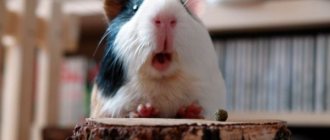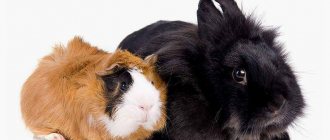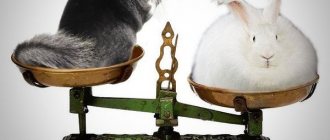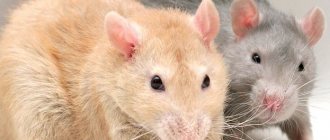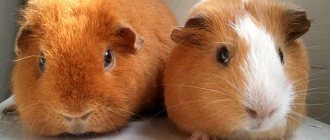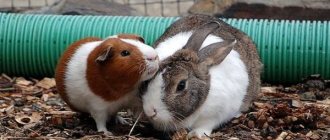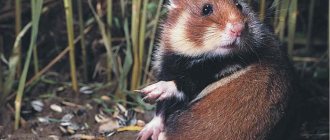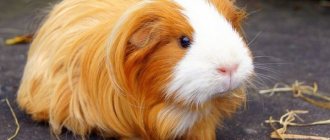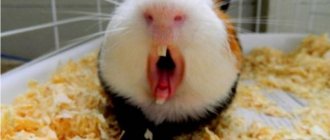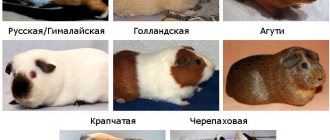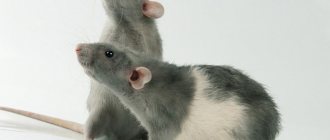When choosing a pet, you should consider care for the next few years. This is not a hobby for a few weeks. The vast majority of people keep dogs and cats at home. But some need to be constantly walked and taken outside, while others leave their fur all over the house. Lately, rodents have become increasingly popular. They do not require much care, do not leave hair and do not require walking. Often the choice is between a chinchilla and a guinea pig. Each has its own content features, pros and cons. They will be discussed in the article.
In favor of the chinchilla
Chinchillas live on average from six to ten years. Very active and friendly, they love a lot of space. They are often allowed to walk around the house. They are housed in large metal cages with a plastic tray, often homemade. The disadvantages include a nocturnal lifestyle, it is at this time that they are most active. They sleep during the day or have lethargic behavior. For this reason, the chinchilla is not suitable for everyone, since at night it is quite noisy and interferes with sleep.
Many animals do not like being alone and need a partner. Chinchillas are not like that; they can be kept alone. Although she will not refuse a partner, since she is very sociable. It will quickly become a good companion and friend for children. In general, there are advantages to supporting one person and an entire family. The behavior is very interesting to observe from the outside, especially when they play together. The male and female during the mating season is a separate issue; they constantly chase each other around the cage or sit next to each other and watch each other.
Chinchillas are distinguished by their intelligence and ingenuity; they quickly understand what’s what and how to behave. Easy to toilet train. Some individuals are very cunning; when they need something from a person, they sit in the corner and look at him. This behavior quickly bears fruit.
You need to feed your chinchilla a variety of foods: nuts, vegetables and fruits, special food, hay, and even food from our table. The animal must have access to fresh water. Since they love to swim, a special bathing suit is left in the cage once a day for an hour.
There are several main advantages of keeping a chinchilla at home:
- Easy care;
- Rare diseases;
- No unpleasant odor;
- They make contact easily with people and animals;
- Easily tamed;
- Are subject to training;
- They never bite;
- Beautiful appearance;
- They have an interesting character and are able to quickly cheer up;
- They live 6-10 years, some individuals live up to 20.
The last fact can be attributed to pros and cons at the same time. Not everyone wants to take responsibility for an animal for a third of its life.
There is one interesting character trait: they are able to be offended and show it. If you don’t take him for a usual walk or entrust the care to other people, you can see that the pet is offended. Cheerfulness disappears, often even stops taking food from hands. But it’s enough to sit next to you and apologize, and she immediately understands everything and becomes active and friendly again.
Chipmunk
The Asian chipmunk lives in Russia. Body length - up to 15 cm, gray or reddish fur with five dark stripes along the back. The tail is long and fluffy. The ears are round, without tufts. Has developed cheek pouches.
- Food: grains, plant parts, nuts, fruits, berries, fish, shellfish, insects, eggs of small birds. In captivity, it eats boiled meat, cottage cheese, bread, and dried fruits. Drinks a lot. A chipmunk will not drink dirty water. In nature it lives for 2-3 years, in captivity - up to 8 years. Makes supplies for the winter.
In captivity you need a large cage with a wheel and a house. In the house, the chipmunk makes a nest from cotton wool, rags, paper and leaves. Chipmunks are loners and do not get along well with each other. Among males, fights often end in death. Even animals of different sexes can fight.
Chipmunk Photo: pixabay.com
The domestic chipmunk eats from hands and allows itself to be petted, but will bite strongly if touched on the stomach or throat. In winter, the chipmunk sleeps, without leaving the house for days. During this period, his movements are sluggish and can be aggressive. In captivity it reproduces easily. One litter per year, 3-8 chipmunks.
You should not pull a chipmunk's tail: its skin is thin and can be easily torn off. It bites off the exposed tail, but loses maneuverability and dies.
The main feature of caring for an animal is to protect it from intestinal disorders. They very often lead to the death of a chipmunk. It does not tolerate heat and direct sunlight. Temperatures above 27 degrees can be fatal for him.
In favor of the guinea pig
Many people prefer guinea pigs. Cheerful and kind animals that get along easily with children and adults. Care depends on the character, some individuals are completely autonomous and do not require interference in their personal life. During this time, you need to make time for others and play with them. In any case, you need to allocate funds for housing. Although the guinea pig is very calm by nature, in some circumstances it may bite, although it does not hurt. The character of a rodent is revealed; it can chew furniture and interior items. Although this situation only occurs in the absence of mineral stone, the animal simply needs to grind down its constantly growing teeth. The guinea pig is quite cautious around people.
2
Like the chinchilla, the guinea pig loves space and therefore requires a large cage. To save money, they often do it themselves. Inside there should be everything you need: a feeder, a drinking bowl, a house and other accessories. To avoid unnecessary odors, you need to buy and install a special toilet, which is cleaned once a day. There must be bedding. The diet needs to be varied and should include greens and solid food that can grind teeth. The pig should also eat vegetables, fruits, grains, grass, tree branches and vitamin complexes.
The guinea pig is smart and has a good memory. Able to recognize its owner and other people. She can be toilet trained and given a nickname. You need to look where the animal goes to relieve itself and place the tray there. There is a whole article about this: how to toilet train a pig. Some people give up on this cute animal because of the unpleasant smell. Not everyone understands how to train a pet and avoid odor problems.
Reviews differ regarding sociability. Some emphasize the autonomy of the pig, that it does not need a person, it just needs to be fed on time. Others at this time claim that without them she makes noise and constantly wants attention and affection. Perhaps it all depends on the upbringing and the number of individuals in one house.
Compared to a chinchilla, a guinea pig is much more susceptible to disease. It can quickly blow out in a draft; you need to watch this and choose a quiet place to place the cage. Most often, diseases affect the digestive system and respiratory tract. Vitamin deficiency can occur just as often if there is no proper nutrition. To prevent this, you need to regularly clean the cage and provide adequate nutrition. By nature, the guinea pig is very active, it is recommended to regularly take it for walks, at least around the apartment.
There are several advantages to keeping a guinea pig:
- We do not require much care;
- Absence of any allergic reactions to them;
- Cheerful and sociable animals;
- Positive and good-natured;
- They eat little;
- They sleep at night, peak activity occurs during the day;
- They love human affection.
The guinea pig gets used to the new environment very quickly. Almost never bites and there is no aggression at all. He quickly runs away from anything he considers dangerous. Loves company, if there are no other animals, the only friend becomes a person. In this case, you need to devote much more of your time to her.
Eight teeth
Degu (Chilean squirrel). Its body resembles a squirrel, length from 9 to 22 cm, weight 200-300 grams. The tail is long and pubescent. The color of the coat is gray and yellow-brown. Degus, like chipmunks, should not be grabbed by the tail. Lives in nature for 3-4 years, in captivity - up to 9 years.
Degu Photo: pixabay.com
- Food: grass, leaves, seeds, roots, fruits. In summer, degus need a lot of grass, in winter - a lot of hay. This is the main food. Seeds, nuts and fruits serve as additions. Degus are intolerant to sugar.
Degus are sociable and live in groups, so in captivity they should be kept in pairs. They reproduce well in captivity. Active during the daytime.
Degus should not be overcooled or in a draft. They are easily tamed, but quickly forget their owner if they are not given constant attention. If you grab a degu unexpectedly, it will bite hard. Usually the animal does not show aggression and behaves peacefully. If a degu walks around the apartment, you need to make sure that it does not get to sweets and indoor flowers: both are dangerous for it.
The cage needs to be equipped with a house. You need to let degus into your apartment when there are no other animals, small children or noisy people nearby. In the first case, the degu itself will suffer, in the second, the child who grabbed it, in the third, the degu will get scared and hide.
Making a choice between a chinchilla and a guinea pig as a pet
When choosing a pet, you must not forget that you will have to take care of it for many years to come; this is not a temporary hobby. Many people have cats and dogs at home. But some need to be walked regularly, while others leave fur everywhere. In recent years, rodents have become popular as pets. They are easy to care for, no hair remains, and they don’t need to be taken outside. Often you have to choose between a chinchilla and a guinea pig. Both of these animals have their own nuances in care, advantages and disadvantages.
Answers to popular questions
Chinchillas are often compared to other rodents and many people simply do not see the difference between them. Are these exotics really different from their four-legged relatives and how do they get along in the same house with other animals?
Even now, the chinchilla continues to be an exotic and unusual animal. To maintain it, you need to choose the right room, ensure the temperature regime and have plenty of finances. But in return for such care, a fluffy and mustachioed pet can become a new member of your family and delight its owner with its friendly disposition.
Article on the topic: Turkish Angora
Chinchilla or guinea pig
Rodents become so popular because they are easy to care for. Fans of chinchillas and guinea pigs see many advantages associated with both animals.
The chinchilla has the following advantages:
- The animal looks funny, the fur is visually and pleasant to the touch;
- lifespan reaches ten years;
- The chinchilla is usually friendly and energetic;
- the most active period is the end of the day, when the owner has already completed his chores and can have fun with the pet;
- can live alone or in a couple;
- gets sick infrequently;
- practically never aggressive;
- is easy to train;
- no unpleasant odor;
- can become a good friend for a child.
However, if you care for this pet according to all the rules, you need to understand that it needs quality and variety of food, as well as significant cage equipment, including a drinking bowl and a place for swimming.
Guinea pigs are also quite unpretentious pets, but they are shy, so it will take a lot of time for the pets to get used to the owner. These animals are not stupid, so they easily remember who their real owner is, respond to their name and are amenable to training.
They also need an equipped cage, however, it is not easy for them to get accustomed to a specific place for the toilet. Due to this quality, the cell may not have the most pleasant smell. A guinea pig and a chinchilla differ from each other in that the former get sick more often.
Positive qualities of guinea pigs:
- easy to care for;
- these pets are good-natured and cute;
- sleep mainly occurs at night;
- they create different sounds, so they are interesting to watch;
- They respond with pleasure to human touch.
In favor of the chinchilla
The lifespan of chinchillas is about ten years. These are very energetic and non-aggressive pets that require a lot of free space. They are often allowed to roam freely around the apartment. Such animals are housed in spacious metal cages with a plastic tray; often such housing is made independently. One of the negative qualities of this pet is that they are active at night; at this time they usually show all their energy. During the daytime they sleep or behave rather slowly. Therefore, not everyone will like a chinchilla, because at night it is not very quiet, which prevents its owner from sleeping.
Chinchillas do not need a mate; they can be kept alone. Although, if he puts another individual in the pair, the pet will not mind, because he is friendly and loves communication. Chinchilla easily finds a common language with children. There are advantages to keeping a rodent alone or with a partner. These animals are interesting to watch, especially when they have fun together, chasing each other around the house or sitting next to each other and watching each other.
Chinchillas are smart and quick-witted pets; they easily understand what is required of them and what kind of behavior they should have. They are toilet trained without difficulty. Some animals are endowed with high cunning, and if they want something, they sit in a corner and look at the owner. This usually works.
A chinchilla needs a varied diet. It should include fruits, vegetables, nuts, hay and even sometimes human food. Clean water should always be available to your pet. Chinchillas love to splash in the water, so every day for an hour you need to put a bathing suit in the house, which can be purchased at a pet store.
In favor of the guinea pig
A lot of people are delighted with guinea pigs. These pets are funny and friendly. They will appeal to single owners and families with children. If you are going to become the owner of such an animal, you should know that it requires some budget for equipment of the home and time to communicate with it. Most pigs are good-natured, but there are those who like to bite and gnaw on everything that gets in their way. When playing with them, you need to be careful. Sometimes rodents themselves show distrust and wariness towards the owner, because they themselves are very cowardly.
To keep a rodent, you will have to acquire a large cage, equipping it with everything necessary for life: a bowl, a drinking bowl, a house and bedding consisting of hay and files. This pet's diet should include special solid food so that the animal can sharpen its teeth, as well as fruits, grains, vegetables and grass.
Don't forget that guinea pigs are quite smart. They distinguish human faces and easily remember the main owner, so as soon as he approaches them, the pets quickly recognize him. Experts suggest that rodents remember their name, but still do not follow commands. Due to the fact that pets do not distinguish between territories for the toilet and other needs, they can go to the toilet anywhere. Therefore, it is worth constantly tidying up the cage so as not to smell a strong unpleasant aroma from the cage. After all, it is precisely because of the smell that many people do not want to have guinea pigs.
Is it worth getting a chinchilla: all the pros and cons
Chinchilla has its own rules of keeping. Therefore, the future owner needs to think carefully about whether he will be able to carefully care for such an exotic animal. Unlike other unpretentious rodents, this pet needs constant attention and financial expenses. A chinchilla is less active than a cat or dog, but requires much more attention. Among the main advantages of such a friend are:
Chinchilla is an exotic animal
- no need for walking;
- cleanliness and minimum of unpleasant odors;
- high life expectancy (about 10 years);
- non-aggressive behavior and learning ability;
- the animal's cheerful and playful disposition.
Article on the topic: Guinea pig allergy in children and adults: symptoms and treatment
But it is worth taking into account the downside of keeping a chinchilla. For example, tangible flaws of such a pet often include:
- expensive accessories and place to live;
- shortage of qualified veterinarians;
- noisy behavior at night;
- increased sensitivity to temperature.
There is an opinion that chinchillas do not like contact with their owners, touching and excessive caresses. But this is not so: it all depends on the mood of the animal and its character. At times they love to sit on your hands and ask to be scratched.
Chinchillas have thick and soft fur. Poor care of a rodent immediately affects the well-being of the pet. If, due to financial restrictions, it is impossible to provide them with a spacious cage or high-quality food, the animal will become lethargic, will often get sick, and its lifespan will be reduced to 5-7 years, if not less.
And if you have children, then you should also supervise the interaction between children and your pet - careless games can harm the rodent and cause stress. These animals are not fans of frequent squeezing and noise, so they will feel uncomfortable next to a child, especially an infant. A chinchilla should only be owned by those who are willing to provide it with suitable conditions and pay plenty of attention.
Which pet is right for a child?
To understand who is better, a guinea pig or a chinchilla, you need to understand why you are purchasing a pet. If this is the baby’s first animal, then it is better to take a chinchilla, because if you care for it correctly, it will live for many years. This will help save the child from psychological trauma in the event of the death of a pet.
If the child needs someone like a cat who will happily spend time in his arms. It is better to choose a guinea pig that is delighted with communication with the owner.
The house we live in
It is impossible to properly arrange a home for a rodent without special knowledge. It is not always enough to set yourself the task of buying a cage
. Sometimes an aquarium (terrarium) or a display case is preferable. A house is also absolutely necessary. It is important to guess the sizes. For example, even the most spacious cage for squirrels will be small; they require an enclosure for constant vigorous activity. A chinchilla cage is taller than a rabbit cage. Ferrets do not need a large cage; they walk a lot “by themselves.”
When getting a hamster at the request of a child, owners often care about only one thing: a cage for the hamster
was inexpensive and reliable. Where will she stand? All domestic rodents are delicate babies and suffer from drafts, which large people do not pay attention to. You can't put the cage on the floor, because it's cooler there. It is better to immediately purchase a special stand.
What to put on the bottom of the cage? And at this point our cute rodents show great diversity. Some people like to dig, while others like to scatter the covering. Ferrets spend little time in cages, but they must have a litter tray next to the house. Cat litter is quite suitable for them. And here is a filler for a hamster
It’s better to buy a special one; you shouldn’t use newspapers or just paper.
Don't forget, smell is the main problem of keeping a rodent in an apartment. The branded filler does not have to be changed daily. Chinchillas can be toilet trained, but bedding is still required. This amazing animal does not smell, but excrement will indicate the presence of a rodent in the house, so it is better to purchase chinchilla litter
. And immediately - special sand for swimming.
As you can see, each rodent has its own approach. And feeding is a whole science. It would seem that a rat is a rat. But it turns out that the wire-haired degu and the white rat need to be fed differently. Information about the nutrition of rodents gleaned from children's cartoons does not correspond to reality. It will be easier to buy food for your hamster
industrial production in a pet store, on the recommendation of renowned hamster breeders. Let the hamster live a little longer.
Choosing a pet is a difficult decision, especially when it comes to rodents. They are all different from each other, have pros and cons, and most importantly, they ideally suit the character of one person, but are completely unsuitable for others.
Who is better
To decide who is more suitable for purchasing, a guinea pig or a chinchilla, you need to consider separately all the advantages and disadvantages of each animal separately. Everyone decides for themselves which animal to buy. Both options are suitable for the role of a pet for children. But you don’t have to choose. These rodents are great friends, so they can live under the same roof without any problems.
If you still can't decide between the two options, try adopting both pets. You need to know that a chinchilla and a guinea pig cannot live in the same house. But two pets at once will become a pleasant holiday in your free time, bringing the owner even more happiness.
Rodents are a delicate matter
Every year the list of pet rodents expands, and this is great - you can find your one and only. You like active and funny babies, and to have a lot of them means gerbils. Peaceful, cute and with wonderful fur that is a pleasure to pet - a guinea pig, chinchilla or rabbit will suit you. You are drawn to intellectual communication and frequent tactile contact - take a rat. They are attracted to larger animals with pronounced play and hunting instincts, similar to cats - pay attention to ferrets. If you want a squirrel, but don’t have enough space, get a degu rat with the same upturned tail.
Each type of rodent has its own character, degree of mobility and contact. Dimensions and weight. The colors and type of fur are what many people react to when purchasing. I would like the owners to also seriously take into account the peculiarities of keeping and feeding. For hamster, for chinchillas
and every other type of rodent is provided with its own food, cages, toys and accessories.
The lifespan of most of the most popular rodents - hamsters, rats and mice - is quite short. They live up to three years, and it will be very sad if, due to errors in feeding, the baby does not even have time to grow up. Larger pigs and chinchillas are considered long-lived, however, provided that the food for chinchillas
the owner carefully selects and monitors the health of the animal.
Some rodents, especially mice, are extremely social and only do well in large company. But under no circumstances should hamsters, even a pair of opposite sexes, be housed in the same house. Zealous individualists must have their own personal territory, otherwise there will be serious bites. Many species are kept alone without any problems and get along well in pairs.
Who is better: a guinea pig or a chinchilla?
CHOOSE YOURSELF)
A chinchilla’s character manifests itself, perhaps, immediately after its birth. You can watch newborn chinchillas, watch how they behave with their brothers and sisters and see that they are all different. Some are more active and persistent, while others are calm. Some people love to sit in their arms and will happily doze off in the palm of their owner’s hand, while others will be curious to explore the environment around them.
Kids grow up, and new features appear in their character, but, in general, he remains the same as he was in childhood. You can try to tame a chinchilla, educate it, but in any case you need to take into account the peculiarities of its character. This is the only way to achieve mutual understanding. If you treat the chinchilla as an individual, let her know that you respect her opinion and her desires, then she will answer you in kind. Chinchillas do not tolerate any kind of violence against themselves. If they want to play with you now, they will play, if not, you will not be able to force it, any violence against the chinchilla will result in the animal simply not wanting to communicate with you or, in extreme cases, the chinchilla begins to bite.
Chinchillas know how to take offense. For example, you didn’t let him go for a walk or you just went on a business trip for a day and left your pet with your family, you come back and see that the little dog was offended. The animal will not run to meet you when you open the cage; it will proudly refuse to take the treat from your hands. But you just have to talk to him, ask for forgiveness for your inattention and that’s it, he will happily start communicating with you again.
Chinchillas are very cunning and intelligent. They quickly understand what's what and learn everything quickly. For example, teaching a chinchilla to go to the litter box is as easy as shelling pears. It is enough to simply remove all the bedding and place a tray with wood filling in the cage; the animal will immediately understand why this is needed and will begin to use it for its intended purpose. Chinchillas are manipulators. With a chinchilla as with a child, they feel and understand everything very well. Very soon the animal knows exactly what to do and what needs to be done to get what it wants from its owner. Someone sadly sits in a corner and looks with pitiful eyes in order to get a tasty treat. Some people, on the contrary, show sociability and activity, knowing that if they stand or jump near the bars on their hind legs, the owner, touched, will give them a treat or let them go for a walk.
It is worth noting that chinchillas are absolutely not evil, but very kind and affectionate animals. A chinchilla only bites if it is in a desperate situation or you are not taking good care of it and it is very afraid of you.
Guinea pigs are sociable animals and thrive best in company. Keeping more of these small, cute rodents provides an opportunity to become familiar with their behavior in a herd, and allows you to observe the varied personalities that can only emerge when the pig feels safe in the environment of its relatives. For a singular pig, the only friend can be a person, and he is obliged to pay her quite a lot of attention so that she does not feel lonely.
Guinea pigs learn quickly and are ideal pets for children. The pig does not bite and does not fight with the enemy. To unfamiliar surroundings, smells, sounds - everything that seems unsafe to her - she reacts with panicked flight or absolute immobility. Under natural conditions, this behavior often saves the lives of these rodents.
These gentle animals show aggression exclusively towards individuals of their own species. It can be found between pigs competing for food or resting place.
What does it take to get a chinchilla?
The opinion that it takes a lot of money to keep a chinchilla is based precisely on the arrangement of its home.
A chinchilla is less active than a cat or dog. Such an exotic rodent really needs significant finances. To begin with, you will have to purchase such mandatory things as:
- cage - from 5 thousand rubles;
- house - 500−700 rubles;
Article on the topic: What to feed a turtle in winter: the diet of land and red-eared turtles in winter
You cannot buy a cage that is too cheap and small - the chinchilla needs space. It's better to immediately take a display case. It is much more expensive, from 15 thousand rubles, but it will last longer and the pet will be more comfortable there.
Equipped area for chinchillas
- drinking bowl - 200−500 rubles;
- bowl - 100−350 rubles;
- bathing suit - 700−1500 rubles;
In addition to start-up costs, it is worth taking care of monthly supplies. It is important to provide the rodent with a complete and as varied diet as possible. And all kinds of wooden accessories will not only become an interesting leisure activity for the animal, but will also help grind down the rodent’s teeth:
- sand (change every 1-3 months) - 200-500 rubles;
- granules (1 kg of main feed) - 400−500 rubles.
- cereals, hay and drying - 300−700 rubles;
- filler (1−5 kg of wood) - 200−400 rubles;
- pieces of wood and pumice - from 100 rubles.
Buy only high-quality feed. Chinchillas cannot eat sweets, and most modern companies sell cheap but low-quality food. Sometimes it is safer to buy food from breeders.
Mother and child in a cage Among the optional but recommended things, it is also worth mentioning a carrier (800-1500 rubles), which can be used for a visit to the veterinarian and as a bathing suit, a hanging hammock for relaxation (600-00 rubles) and a container for filler ( 200−500 rub.).
Guinea pig, rabbit or chinchilla?
There comes a time in every family when growing children want to have a pet. Choosing an animal is not an easy task, especially when parents do not have time to walk it, and the child himself cannot yet fully take on the responsibilities of maintaining a pet.
The solution is to buy a small rodent. He lives in a cage, can go for walks right in the apartment, and spending the day alone is not a big problem for him.
Each animal has its own advantages and disadvantages. Knowing them will help you make the right choice.
Rabbit
Many people like kittens, but they are often allergic to them, and therefore a tiny rabbit can be an alternative - representatives of decorative breeds can easily fit in the palm of your hand and weigh around one and a half kilograms. And you can really play with it: rabbits are very mobile, and therefore need daily walks around the room.
Aggression is not typical for these animals.
The advantages include the following:
- rabbits are easy to litter train;
- they do not make noise at night and behave calmly most of the time;
- It is easy to keep order in their cage.
These rodents are demanding when it comes to food, but if you provide them with hay, grass and twigs in a timely manner, and also buy the necessary mineral and vitamin supplements, there will be no problems with feeding. The same applies to health - regular vaccinations and visits to the veterinarian will protect animals from infections.
One of the disadvantages is excessive mobility - children cannot always hold the rabbit in their hands. In addition, animals have a tendency to chew on something if left unattended during a walk. Also, the decorative rabbit requires timely cleaning of the cage and tray. He will have to be fed frequently and ensure that there is always clean water in the drinking bowl.
Chinchilla
The chinchilla in the photo seems to be a very beautiful, cute and harmless little animal that you want to pet. In reality, it's not that simple.
Chinchilla is a capricious animal. She needs constant care and good conditions - this is an additional financial expense. Children from 10-12 years old will be able to fully care for a rodent. Otherwise, parents will have to take on most of the care of the animal.
The animal needs a lot of space, so it is better to buy a large cage. Chinchillas are quite nimble, so the distance between the bars should be such that the mouse does not accidentally jump out. You can and should let her out for a walk, but you should carefully ensure that the pet does not hide somewhere under the sofa, otherwise it will take a long time to find him.
It is also worth taking into account the fact that the chinchilla is a nocturnal animal, which means you will have to get used to its constant wakefulness in the dark. Although there is a plus to this - during the day the rodent sleeps more, and in the evening, when the whole family gathers, it begins to be active. This is the best time to play with your chinchilla and pick it up.
This animal also has other advantages. Chinchillas do not smell at all because they do not have sebaceous glands. They are interesting to watch if they are in a good mood. Although a child with a chinchilla needs to be careful: it can easily bite.
Guinea pig
Many people are attracted to the guinea pig not only by its appearance, but also by its interesting name. The cute little animal is constantly on the move. Therefore, pigs sometimes cause a lot of noise and fuss. But she loves to sit in her arms - in this regard, the animal is quite capable of replacing an affectionate kitten. That’s why children like these rodents more.
A guinea pig asks for a lot of food - and will eat the same amount if it is not initially accustomed to the regime. Although she is not very demanding when it comes to food: hay, grass, and a little bit of vegetables and fruits are suitable.
A guinea pig often goes to the toilet, and it is almost impossible to train it to the litter box. Unlike a chinchilla, a smell quickly develops in a pig's house. Sawdust, which needs to be changed regularly, will save you. In general, a large amount of debris around the cage is a problem for both animals.
At first, the guinea pig can be shy. But he quickly gets used to his owner and even remembers his name.
Children will likely enjoy playing with a guinea pig, especially since these rodents are capable of making many different sounds. At night they sleep and do not bother their owners. And guinea pigs don’t require any special care.
Each of the rodents is good in its own way, but it is worth considering the age of the child and the character of both. Rabbits or guinea pigs are the best choice for younger children who prefer quiet time. Chinchillas are given to active children who are able to understand responsibility.
Nutriaceae
Nutria Photo: pixabay.com
Nutria. It looks like a rat, up to 60 cm in length, weight up to 10 kg. It is a semi-aquatic animal; the structure of its mouth and nose allows it to feed underwater. She swims and dives well. The fur is thick, waterproof, brown with a yellow tint. In nature it lives for 4-6 years, in captivity - up to 10 years.
Nutria must be provided with the opportunity to swim and bathe. The water needs to be changed very often: nutria will not swim in dirty water, much less drink it. It is necessary to build her a house. In nature it is active mainly at night.
- Food: stems and leaves of reeds and cattails, reeds, water chestnuts, water lilies and other aquatic plants. He rarely eats animal food (fish, leeches, shellfish).
Nutria is quickly tamed. Breeds well in captivity. Lives in groups or pairs.
Why can't chinchillas live with hamsters?
The problem is that your chinchilla and your hamster are two different species of pets, and the different species naturally compete with each other.
If you can only get one, we recommend talking to the breeder directly and seeing if you can spend time with each to see which one you like best. You can go to a pet store, but we do not recommend supporting pet stores as they usually keep their animals in unsuitable conditions. You can also ask your friend if any of your friends have any pets and if you can spend time with them. After viewing and processing both, you should know which you like better.
